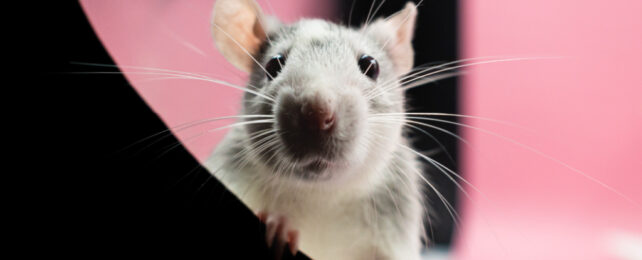Smelling a potential new mate could impact how long an animal lives and its ability to reproduce, according to a new study.
Scientists found that simply exposing male mice to the scent of unknown females during middle to old age decreased the number of litters they could sire later in life. If these female-odor-sniffing males were allowed to mate, they were also likelier to die earlier than males who didn't smell outsider females before mating.
The researchers from New Zealand and Australia say their study demonstrates that sensing the social environment may play a role in the aging process.
"Our results add to the growing evidence that indirect cues from mates can influence the aging process," writes biomedical scientist Michael Garratt from the University of Otago in New Zealand and his colleagues in their published paper.
"Responses induced by opposite-sex odors may be important in priming physiology in anticipation of reproduction so that animals can effectively engage in social interactions that are important for fitness."
Recent research on fruit flies suggests that the nervous system may allocate resources between reproduction and aging based on environmental signals.
Pheromones from mates can speed up aging in worms and fruit flies, regardless of reproduction, based on activating brain reward pathways related to mating. Allowing fruit flies to mate helped them live longer, but it was unclear if this happens in vertebrates like us.
Higher reproductive activity in early life is associated with a shorter lifespan in some mammals, but studies suggest exposure to certain smells can modify this effect. Odors from adult female mice can delay puberty in young females and allow them to live longer. In male mice, on the other hand, living and mating with females seems to influence metabolic rate and body weight, and living with females can extend male lifespans.
Garratt and his team wanted to see how exposure to unknown female odors would affect reproductive aging in male mice. They had two ideas about how it would turn out: it could speed up aging, although mating could counteract that effect; or, exposure to new female scent could mimic the positive effects of mating, potentially improving survival and slowing reproductive aging.
Neither hypothesis was quite right in the end.
The researchers studied four groups of males in different social environments: those living alone; those living with two females; those living alone but exposed to the smell of two absent females; and those living with two females while also exposed to the odor of two absent females.
All groups lived in these conditions from 10 to 24 months old – or throughout middle and old age – when male mice naturally experience reduced fertility. At 24 months old, all the males that were still alive in each group were paired alone with two young females for 64 days to assess how their prior living conditions impacted their mating and fertility.
Males in the two groups that were exposed to absent female odors had fewer litters later in life than those not exposed to the smells. This was true even for males that lived with other females. The link between unknown female smells and fertility wasn't apparent in younger mice.
Also, letting males mate with females earlier in life didn't affect reproductive aging, which suggests the smell of absent females is somehow playing a bigger role in later-life fertility.
"Thus, the perceived presence of females via olfactory cues within the environment, when not matched to the physical presence of those females in the environment, impairs later-life fertility," Garratt and team write.
Older male mice in experiments generally had fewer sperm, smaller testicles, and other signs of reduced fertility compared to younger ones. However, smelling females didn't affect these reproductive factors.
"The mechanisms responsible for reduced longevity in males exposed to female odor remain to be established," the team writes.
"One possibility is that earlier exposure to female odors increased male reproductive investment early in life, and this generated the associated fertility and mortality trade-off."
Sensing new females in the environment may cause changes in male mice that make them more invested in male-male competition, a key part of their reproductive investment. Males in this study didn't encounter other males, but Garrett and team suggest physical changes could occur to help them if they did meet other males.
"Our results show that exposure to female odors can influence reproductive aging and mortality in male mice," the authors write, "highlighting that sensory perception of mates may be an important driver of life-history trade-offs in mammals."
The study has been published in Proceedings of the Royal Society B: Biological Sciences.
